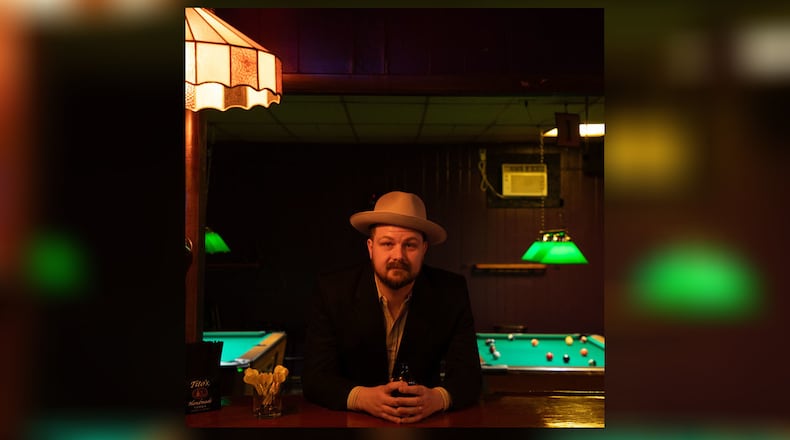Lyrically, each track on “Last Call” bounces from patron to patron, giving spotlights to the otherwise dimly lit — in illumination and intoxication. These might be fictional hard-drinking night owls, but Payne’s wit (in “Best Intentions”), darkness (in “Sorrow Drowns”) and empathy (in “Blue Lights”) bring substance to characters that might otherwise seem one-dimensional, allowing their humanity to shine through.
Payne’s last two solo records, “Cheaper Than Therapy” (2017) and “Orange Glow” (2019), toed the line of country music, but this new record crosses that threshold — with a full band to boot. “Last Call” wears Willie Nelson, Buck Owens, Merle Haggard and Dwight Yoakam on its sleeve, but this is undeniably a David Payne record, performed alongside top brass Southwest Ohio musicians.
“Last Call” features Patrick Himes on bass and supplemental percussion, Brian Hoeflich on drums, Dayton Philharmonic’s John Lardinois on fiddle, Dan Spaugy on guitar, brother Matt Spaugy on tic-tac bass, Trey Stone on piano and Heather Redman on vocals on “Finish Your Drink.” Wayne Hobbs, whose paychecks were signed by musical greats like Marty Robbins and Jerry Lee Lewis, played pedal steel on the record. Hobbs passed away on June 10 at the age of 72.
With a talented ensemble like that, the tonal foundations are sound and the instrumentals are in the pocket.
During a session, Trey Stone had 20 minutes before he had to be out the door. Payne insisted Stone have a go at the honky tonk piano for another song, just to see what would happen.
“There were a lot of first takes on this record,” Payne said. “[Stone did] one take, and it’s absolutely perfect. I don’t know if he’d listened to the song before.”
Brian Hoeflich knocked out all of his drum tracks in four hours. The Brothers Spaugy had a similar experience in the studio. On the album’s second single, the haunting Johnny Cash pastiche “Sorrow Drowns,” John Lardinois’ initial fiddle take can be heard throughout all the verses and choruses; the only part that had a second take was the solo.
“[Lardinois] played a great solo, but I went out in the other room after we cut it and I’m like, ‘Hey, man, I wrote this part for you. You cannot possibly play too much,’” Payne said. “And then he went out and did that second take, and it still shocks me every time I hear it. That fiddle solo just rips. Without it, the song is not nearly as exciting and maybe doesn’t even make the record.”
The songs and arrangements on “Last Call” are true to those traditional records Payne regards. But production-wise, from Payne’s perspective, it’s closer to a modern country record, despite tracking everything analog. Giving attention to the low-end and doubling those tones is more akin to 1990s country rather than the thinner mid-century recordings. Still, this album’s a country buffet that could bode comfortably in any era.
During the lockdown in 2020, Payne wasn’t inspired to write the way he would normally. Most of his writing comes from conversations, interactions and observations out in public — which were rarely happening at the time — so he gave himself a prompt: to write different songs from the different perspectives of people in the same bar.
Along with a little Willie inspiration — ostensibly the musical kind — the saloon doors swung open and the loose concept opened a tab at the local watering hole. Eleven songs later, the album was finished.
The album release show at Yellow Cab Tavern — not to be confused with the title saloon of a similar name — featured the croonin’ and cryin’ Moe Reen (Columbus), Americana band Age Nowhere (Dayton) and David Payne & the Midwest Business Machines for a night of country music and Miller High Life.
David Payne has worn several hats, often literally, but whether he rocks Americana with the New Old-Fashioned, soulful keys with Heather Redman & the Reputation or goes full-fledged country, the hat fits.
Music is ever-evolving, especially as more synthesized sounds enter the fold, so why head back to that same old bar again?
For the stories, gritty aesthetics and honesty. The cheap drinks at the Yellow Horse Saloon are just a perk.
About the Author

